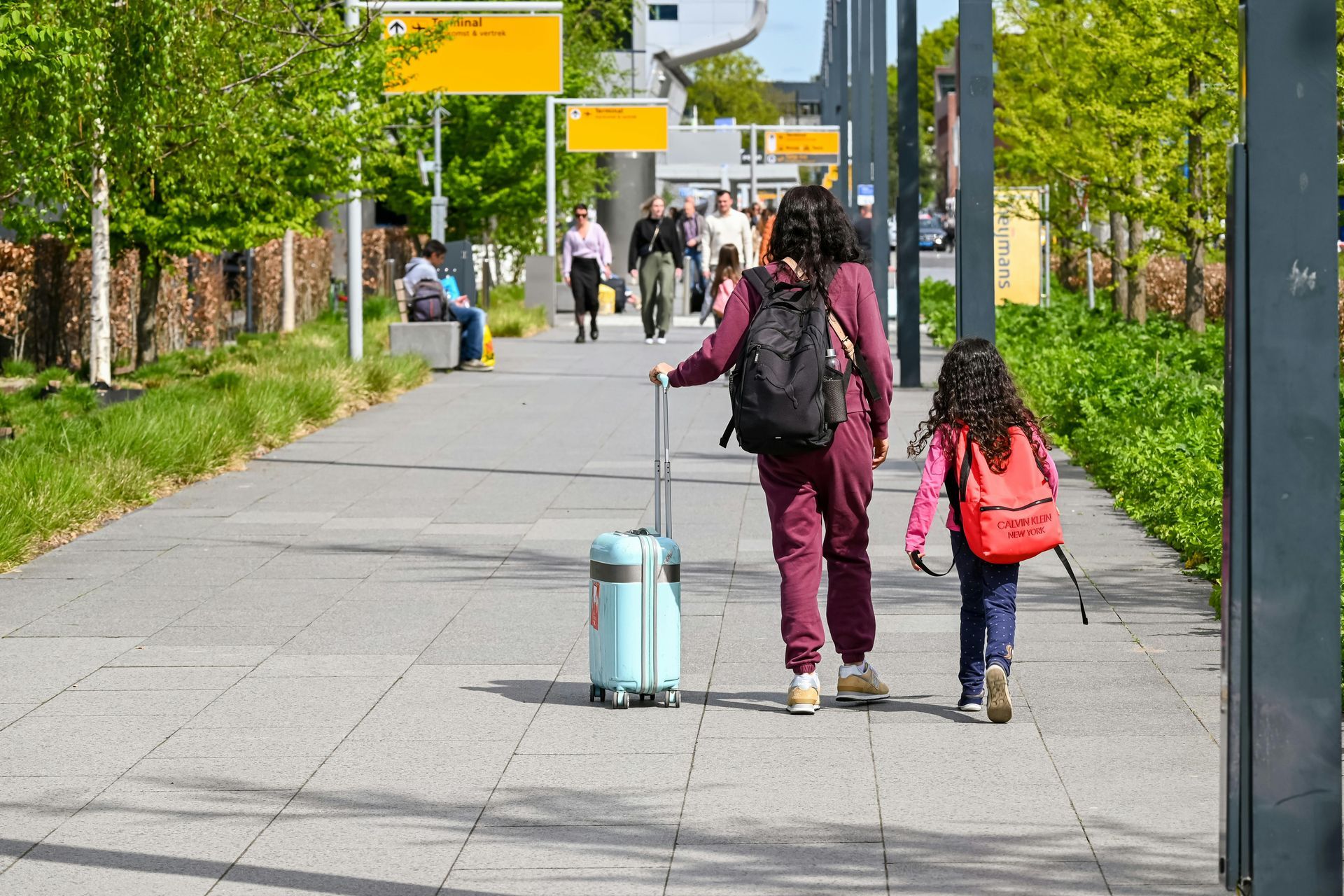DHS Announces TPS for Lebanon
Denice Flores • December 12, 2024
The U.S. Department of Homeland Security (DHS) announced the designation of Lebanon for Temporary Protected Status (TPS), allowing eligible Lebanese nationals in the United States to stay and work temporarily due to unsafe conditions in their home country. The decision, published in the Federal Register, is based on the ongoing humanitarian crisis in Lebanon, which includes economic instability, widespread violence, and the aftermath of the devastating 2020 Beirut port explosion.
The TPS designation for Lebanon is effective December 2023 and will last for 18 months. Lebanese nationals who have been residing in the U.S. since August 1, 2023, may apply for TPS, as long as they meet the eligibility requirements.
Lebanese nationals who are granted TPS will be allowed to stay in the U.S. legally, work, and obtain travel authorization during the designated period. This measure is in line with the Biden administration's efforts to assist individuals from countries facing dire conditions. Applicants are advised to apply as soon as possible and to submit the necessary documentation to receive TPS status and related benefits.
This designation underscores the U.S. government's support for Lebanese nationals affected by the difficult situation in Lebanon.
If you have any questions or would like to know more about the eligibility requirements, contact our office to schedule a consultation with one of our experienced attorneys.
This blog is not intended to be legal advice and nothing here should be construed as establishing an attorney client relationship. Please schedule a consultation with an immigration attorney before acting on any information read here.
Denice Flores
This Facebook widget is no longer supported.
Similar Posts

On January 28, 2025, Secretary of Homeland Security Kristi Noem vacated the January 10, 2025, decision by former Secretary Alejandro Mayorkas that had extended the 2023 designation of Temporary Protected Status (TPS) for Venezuela and ordered that his January 17, 2025, notice re-designating Venezuela TPS be vacated. This action has understandably caused confusion and concern among Venezuelan TPS beneficiaries and those with pending applications. It is critical to clarify that this does not mean that the TPS program for Venezuela has been eliminated . Instead, the Department of Homeland Security (DHS) must now reconsider whether to re-designate (extend) or terminate the previous Venezuela TPS designations from 2021 and 2023. What Does the Vacatur Mean? Because the January 17, 2025, TPS extension was vacated, the most recent valid TPS designation for Venezuela remains the October 3, 2023, designation . The vacatur does not immediately affect TPS protections for individuals covered under the prior designations. However, DHS must make key decisions in the coming months: By February 1, 2025 , DHS must decide whether to extend or terminate the October 3, 2023, designation . By July 12, 2025 , DHS must decide whether to extend or terminate the March 9, 2021, designation . If the Secretary does not make a timely determination (for example, if the Secretary were not to make determination by February 1, 2025 whether to extend or terminate the 2023 Venezuela TPS designation), then the statute provides for an automatic extension of the designation for an additional period of 6 months . INA 244(b)(3)(C), 8 U.S.C. 1254a(b)(3)(C). Until these decisions are made, TPS remains in effect under the previous designations , and those who have already been granted TPS are not immediately impacted. Who Is Affected and What Should You Do? Current TPS Holders If you were already granted TPS under the March 9, 2021, or October 3, 2023, designations, your status remains valid. You must continue to comply with all re-registration requirements to maintain your protection and work authorization. Re-registration period: TPS beneficiaries under the 2021 and 2023 designations must re-register between January 17, 2025, and September 10, 2025 , to maintain their legal status and work authorization. Individuals with Pending TPS Applications as of January 17, 2025 If you applied for TPS before January 17, 2025 , under a previous designation, your application will continue to be processed . If your application is approved, your TPS protection will remain valid at least until April 2, 2025 . There is no need to reapply. Individuals Who Applied for TPS Between January 10, 2025, and January 28, 2025 If you applied for TPS during this period, USCIS will cease processing your applications and issue refunds of any fees paid in association with those applications . Additionally, USCIS will invalidate EADs; Forms 1-797, Notice of Action (Approval Notice); and Forms 1-94, Arrival/Departure Record (collectively known as TPS-related documentation) that have been issued with October 2, 2026 expiration dates under the January 17, 2025 Mayorkas Notice. What Happens Next? Given the Biden administration’s prior support for TPS, many expect DHS to extend or re-designate Venezuela for TPS rather than terminate it . However, no final decision has been made , and Venezuelan nationals with TPS or pending applications should continue to follow updates closely. What Should You Do Now? If you currently hold TPS , continue to comply with all TPS renewal requirements and remain aware of DHS’s upcoming decisions. If you have a pending application , check USCIS updates regularly and consult with an immigration attorney for the latest guidance. If you applied between January 17, 2025, and January 28, 2025 , seek legal counsel to understand how the vacatur may affect your application. Stay Informed and Get Legal Guidance Our immigration firm is closely following these developments and will provide updates as soon as DHS makes its decision. If you have questions about your TPS status or how this memo affects your case, contact our office today for a consultation. For more information, refer to the official DHS notice on the vacatur: Vacatur of 2025 Temporary Protected Status Decision for Venezuela .

The U.S. Department of Homeland Security can allow foreign nationals to apply for Temporary Protected Status or TPS, if the foreign country is facing conditions that temporarily prevent the country’s nationals from returning safely or if the country is unable to handle the return of its nationals. Country conditions that trigger this are ongoing armed conflict, such as a war, an environmental disaster or an epidemic, and other extraordinary and temporary conditions. If the U.S. Department of Homeland Security designates a foreign country for temporary protected status, the U.S. Citizenship and Immigration Services allows eligible foreign nationals of the country, who are in the United States, to apply for and be granted TPS. What does TPS do? A foreign national who is granted TPS is not removable, meaning the individual cannot be removed or deported to the foreign country. The foreign national also cannot be detained by U.S. immigration officials on the basis of his or her immigration status in the United States. The foreign national can obtain employment authorization (work permit) to work lawfully in the United States, and also a travel permit to travel abroad, during the time he or she has TPS. It is important to note, however, that TPS is a temporary benefit for foreign nationals. This means that TPS will not lead a foreign national to obtain lawful permanent residence or a green card, U.S. citizenship, or any other immigration status. However, if the foreign national is granted TPS, he or she may still apply for other immigration relief. TPS does not disqualify a foreign national from applying for other forms of immigration relief. Currently, the U.S. Department of Homeland Security has designated the following countries for TPS: Afghanistan, Burma, Cameroon, El Salvador, Ethiopia, Haiti, Honduras, Nepal, Nicaragua, Somalia, South Sudan, Sudan, Syria, Ukraine, Venezuela, and Yemen. If you have any questions on whether you qualify for TPS, please schedule a consultation with one of our experienced attorneys and we will be more than happy to assist you.

El día 08 de marzo del 2021, el Secretario del Departamento de Seguridad Nacional, el señor Alejandro Mayorkas firmó una proclamación mediante la cual otorgó el denominado “Estatus de Protección Temporal” , en adelante “TPS” a los nacionales de Venezuela por un periodo de 18 meses. Con razón de esta proclamación nos gustaría brindar alcances generales del “TPS” en las próximas líneas. ¿Qué es el TPS? Éste es una herramienta legal de protección migratoria temporal que se otorga a los nacionales de determinados países que estén pasando por cualquiera de las siguientes situaciones extremas: i) conflicto interno armado, ii) desastre natural o iii) alguna situación coyuntural que impide a los nacionales regresar de manera segura a su país. Los países que estén pasando por una situación extrema deben estar expresamente designados por el Gobierno Americano, como en el reciente caso de Venezuela. ¿Cuál es el plazo de duración del TPS? El plazo de esta protección puede darse de 6 hasta 18 meses. En el caso de Venezuela es de 18 meses, los cuales culminan en setiembre del 2022. Dicho plazo puede ser renovado en tanto y cuanto el Gobierno Americano declare que la situación extrema continua en el país designado. ¿Cuáles son los beneficios del TPS? Los nacionales del país designado a quienes se les otorgue el TPS podrán gozar de los siguientes beneficios: i) Permiso para trabajar y número de seguro social; ii) Viajar fuera de los Estados Unidos América con el correspondiente permiso otorgado; iii) No podrán ser detenido por motivos de su estatus migratorio; iv) Si la persona tiene estatus migratorio al momento de ser otorgado el TPS, entonces la persona podrá acumular dos estatus migratorios bajo determinadas condiciones. ¿Cuáles son los requisitos? Los requisitos que se deben cumplir a efectos de obtener el TPS son los que se detallan a continuación: i) Ser nacional del país designado; ii) No tiene relevancia el estutus migratorio al momento de presenter la solicitud; iii) Tener presencia física y residencia continua a partir de la fechas requeridas por el Gobierno Americano. Para el caso de los Venezonalos, esas fechas son 09 y 08 de marzo respectivamente; iv) Haberse registrado para el TPS dentro del plazo establecido por el Gobierno Americano. Para el caso de los Venezonalos, el registro se debe realizar desde el 09 del marzo hasta el 05 de setiembre del presente año. ¿Cuáles son los documentos que se deben presentar con la solicitud? En términos generales, son los que se detallan a continuación: i) Pasaporte, partida de nacimiento u otro documento que acredite la nacionalidad; ii) Formulario I-94, entre otros documentos, para acreditar la presencia física en la fecha requerida; iii) Recibos de servicios, compras, impuestos, entro otros documentos para acreditar la residencia continua en este país. Si tienes alguna pregunta o duda sobre el TPS para Venezolanos, por favor agenda una consulta de registro totalmente gratuita. Esperamos trabajar en su caso en un futuro cercano!

U.S. Citizenship and Immigration Services (USCIS) has announced a major change to the H-1B cap selection process. Under a final rule issued on December 29, 2025, USCIS will replace the long-standing random H-1B lottery with a wage-weighted selection system that favors higher-paid and more complex positions. The rule is scheduled to take effect on February 27, 2026 , just ahead of the fiscal year 2027 H-1B cap registration season, unless delayed by legal challenges. If implemented, USCIS is expected to release additional guidance explaining how employers must submit registrations under the revised process. This change marks one of the most significant reforms to the H-1B program in recent years. Up until 2025, all registrations were treated equally once the annual cap was reached. Under the new system, selection odds will be tied to wage levels based on the U.S. Department of Labor’s Occupational Employment and Wage Statistics data. All H-1B registrations will still be placed into a single selection pool, but registrations tied to higher wage levels will receive multiple entries into that pool, increasing their likelihood of selection. Lower wage levels will receive fewer entries, making selection less likely but not impossible. H-1B wage levels are not determined solely by salary. Each wage level reflects the complexity of the job, the level of responsibility involved, and the education and experience required . Entry-level positions involving routine duties and close supervision are generally classified at the lowest wage level, while positions requiring independent judgment, advanced skills, and significant responsibility fall into higher wage levels. The highest wage level is reserved for roles that involve expert knowledge, strategic decision-making, and substantial leadership or technical authority. USCIS is expected to closely scrutinize selected petitions to ensure that the wage level claimed during registration is supported by the job duties and salary offered in the petition. Any discrepancies between the registration and the petition may result in requests for evidence, denials, or enforcement action. With the elimination of the purely random lottery, employers should begin preparing early by carefully evaluating job descriptions, wage levels, and overall H-1B strategy. Accurate classification and thoughtful planning will be essential under this new wage-based selection system. If you are an employer considering H-1B sponsorship, or a foreign professional wondering whether your position may qualify under the new wage-based system, consulting with experienced immigration counsel is more important than ever. Santos Lloyd Law is actively advising clients on H-1B cap registrations and strategy under the new rules. To discuss your options or determine whether you may qualify, contact our office to schedule a consultation.

During the recent administration there has been an increase in issuance of Requests for Evidence for EB-1A petitions for those of Extraordinary Ability. A Request for Evidence is a request that is made by USCIS that should explain how the evidence is deficient in proving the criteria argued and what additional evidence needs to be provided by the applicant to meet the criteria. EB-1A petitions are already normally subject to higher scrutiny because their approval is the first step needed to apply for Lawful Permanent Residence or a green card. USCIS normally requires not just evidence but that the evidence be provided with context and information to show why it matters in a particular field. For example, if you were providing evidence of your membership in an organization that requires outstanding achievements of its members, just providing evidence of the membership is not enough. You must explain what that membership is and provide background information on the organization granting the membership. You also need to provide evidence on the criteria that is used to select the members, information on those who select the members to show that they are recognized experts, other documentation such as articles about the membership organization to show its importance, and any other relevant evidence and background information to show that the criteria is met. A request for evidence being issued prior to the current administration was not uncommon, but in the current climate it is more surprising to not receive a request for evidence for this type of case. It is important to remember that a request for evidence is not a denial. Depending on the validity of the information in the request and the substance some Requests for Evidence can be overcome, and the case be approved. It is important to carefully review the request and note if there are any errors in the content and application of the regulations by USCIS. If you have an attorney, you should work with them and make sure that you provide any evidence you think may be helpful. Although there is a deadline by which a response must be submitted, attention to detail and patience will go a long way when dealing with having to respond to a request for evidence. If you believe you may qualify for this type of visa, please feel free to contact our office.

Once you have connected with a college program, have been admitted to the school, and deemed eligible to compete athletically, you will need to secure an F-1 student visa in order to actually attend your new college and begin your time as a student athlete. The first step in the visa process is to receive your Form I-2




